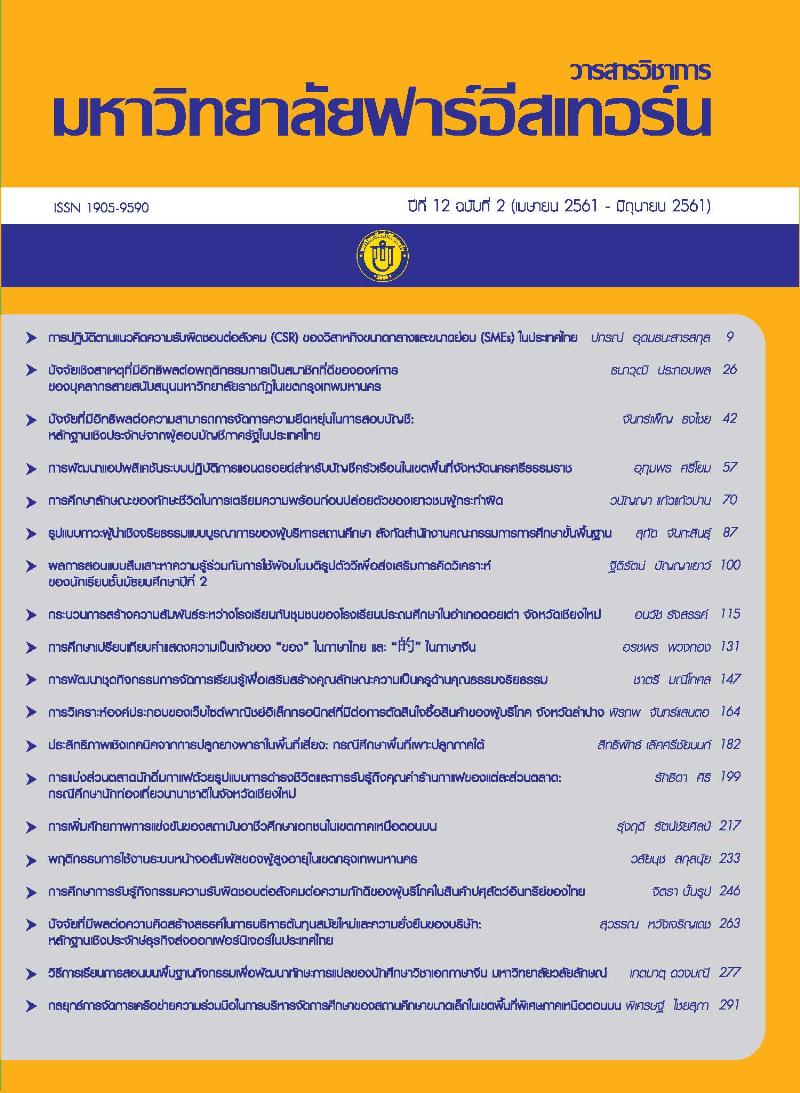An Integrated Ethical Leadership Model for School Administrators of TheOfficeof the Basic Education Commission
Main Article Content
Abstract
This research aimed to study the ethical leadership factors of school administrators for to create and develop a model of integrated ethical leadership for school administrators by using quantitative and qualitative researches. The research was carried out into two phases; in the first phase, it aimed to study ethical leadership factors of school administrators by reviewing relevant documents and research papers and conducting school administrators focus group discussion. The questionnaire was also used to collect data from school administrators in educational institution to do factor analysis. The study of best practices were done by structural interview school administrators who had reputation in good ethical and moral practices. Phase two aimed to create and develop the model of integrated ethical leadership of school administrators through the assessment and evaluation process by experts and specialists. Target sample group in this study includes 400 school administrators in the name of the Primary Educational Service Area Office in 8 provinces in upper northern area. Statistics used to analyze quantitative data in this research are ; frequency distribution, percentage, analysis of mean ( ), standard deviation (S.D.) and Procedures of Qualitative Content Analysis
The results revealed that factors associated in the ethical leadership among school administrators consist of four dimensions of factor namely; administration, relationship management, change management and ethical management.Models of integrated ethical leadership of school administrators consist of threedimensions namely; EthicalTask Management dimension 15 elements, Ethical Relationships Management dimension 14 elementsEthical Change Management dimension 12 elements
Article Details
1. Any views and comments in the Journal of Social Innovation and Lifelong Learning are the authors’ views. The editorial staff have not to agree with those views and it is not considered as the editorial’s responsibility.
2. The responsibility of content and draft check of each article belongs to each author. In case, there is any lawsuit about copyright infringement. It is considered as the authors’ sole responsibility.
3. The article copyright belonging to the authors and The Far Eastern University are copyrighted legally. Republication must be received direct permission from the authors and The Far Eastern University in written form.
References
กนกอร สมปราชญ์. (2564). ภาวะผู้นาทางการศึกษา. ขอนแก่น: ภาควิชาการบริหารการศึกษา คณะศึกษาศาสตร์ มหาวิทยาลัยขอนแก่น.
นันทวรรณ อิสรานุวัฒน์ชัย. (2550). ภาวะผู้นำที่พึงประสงค์ในยุคโลกาภิวัตน์: ศึกษาจากหลักพุทธธรรม. ปริญญาพุทธศาสตรมหาบัณฑิต สาขาวิชาพระพุทธศาสนา. บัณฑิตวิทยาลัยมหาวิทยาลัย มหาจุฬาลงกรณราชวิทยาลัย.
พระเมธีธรรมาภรณ์. (2539). รุปแบบการปลุกฝังคุณธรรมและอาชีพของคนไทยสมัยก่อนกับสภาพปัจจุบัน.
ศึกษาธิการ,กระทรวง. (2546). พระราชบัญญัติการศึกษาแห่งชาติ พ.ศ.2542 และที่แก้ไขเพิ่มเติม (ฉบับที่2) พ.ศ.2545. กรุงเทพ : โรงพิมพ์องค์การรับส่งสินค้าและพัสดุภัณฑ์ (ร.ส.พ.).
สิวลี ศิริไล. (2550). ความรู้เบื้องต้นเกี่ยวกับความคิดการใช้เหตุผลและจริยธรรม. เอกสารประกอบคำบรรยาย ณ มหาวิทยาลัยสวนสุนันทา. กรุงเทพฯ: มหาวิทยาลัยสวนสุนันทา.
สุทธิ ทองประดิษฐ์. (2533). ทฤษฎีการบริหาร. มหาสารคาม : คณะศึกษาศาสตร์
มหาวิทยาลัยศรีนครินทรวิโรฒ.
สุเทพ พงศ์ศรีวัฒน์.. (2550, เมษายน-มิถุนายน). ภาวะผู้นำเชิงจริยธรรม (Ethical Leadership). วารสารดำรงราชานุภาพ. 23(7), 57-62.
______. แนวคิดแบบภาวะผู้นำที่ฉลาดรู้ทางอารมณ์ต่อสัมฤทธิ์ผลขององค์การ
(EQ Leadership Styles That Gets Results). บทความทางวิชาการ Leadership 36. 15 ตุลาคม 2559, สืบค้นจาก http:// suthep.ricr.ac.th.
______. แนวคิดผู้นำที่ฉลาดรู้ทางอารมณ์ (Emotionally Intelligent Leadership).บทความทางวิชาการ Leadership 18. 15 ตุลาคม 2559, สืบค้นจาก http:// suthep.ricr.ac.th.
______. แนวคิดภาวะผู้นำแบบเหนือชั้น (The Transcendental Leadership). บทความทางวิชาการ Leadership 39. 15 ตุลาคม2559, สืบค้นจาก http:// suthep.ricr.ac.th.
______. แนวคิดศิลปความเป็นผู้นำแบบเคออร์ดิก.. บทความทางวิชาการ Leadership 35.15 ตุลาคม 2559,สืบค้นจาก http:// suthep.ricr.ac.th.
อรุณ รักธรรม. (2538). พฤติกรรมในระบบราชการ.กรุงเทพฯ:คณะรัฐประศาสนศาสตร์ สถาบันบัณฑิตพัฒนบริหารศาสตร์.
Daft, R.L. (2005). The Leadership Experience. 3rded. Mason, OH : Thomson South-Western.
Fullan, M. (2003). The moral imperative of school leadership. Crowin Press. Goodstein, L.D.and others. 1993. Applied strategic planning : A comprehensive guide. New York : McGraw-Hill.
Greenleaf, R.K. (1970). What is Servant Leadership. Online 24 February 2014, http://www.greenleaf.org/whatissl/.
Murphy, J. (2001, April). Reculturing the profession of educational leadership: New blueprints.Educational Administration Quarterly.
Sergiovanni, T. J. (1992). Moral leadership Getting to the heart of school improvement. San Francisco : Jossey-Bass publisher.
Spears, L. C. (2004). The Understanding and Practice of Servant-leadership. In L. C. Spears, & M. Lawrence (Eds.), Practicing servant leadership: Succeeding.
Yukl, G. (2002). Leadership in Organizations. 5th ed. New Jersey : Prentice-Hall, Inc.

